Best Self Improvement Books 2023

Self-improvement is a journey to better ourselves in various areas of our lives. Whether personal growth, career advancement, or simply becoming a better version of ourselves, there’s always room for improvement. While countless resources are available to help us on this journey, few are as powerful as a good book. The right self-improvement book can provide guidance, inspiration, and the tools to make meaningful life changes. In this blog post, we’ll explore some of the best self-improvement books and highlight how they can help you on your path to personal growth and development.
Here is a list of the best self-improvement books.
Disclaimer: All these books are for those serious about changing their lives. These authors are all successful in their fields. They are writing for audiences ready to start the work to change their lives. You may find the content offensive if you read it before you are ready. That is because sometimes the truth hurts. That being said, reading is about gaining knowledge and using that knowledge to make our own decisions. All these authors are successful and respected, but you should not take what they say as gospel in your life without deciding what is true to you. You cannot simply read these books and move on with your life. You must read, ponder and reflect, and then choose how to act upon your learning. Let’s get onto the list if you are ready to change your life.
1. 12 Rules for Life: By Jordan Peterson
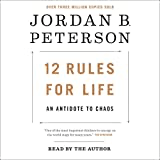
“12 Rules for Life” is a thought-provoking and engaging book that offers readers practical advice on improving their lives. Jordan Peterson, a clinical psychologist and professor of psychology, presents 12 principles that he believes are fundamental to leading a fulfilling and meaningful life. Each chapter is dedicated to one of these rules, and Peterson draws on a wide range of sources – from ancient myths to modern psychology – to illustrate his points.
One of the strengths of this book is Peterson’s ability to make complex concepts accessible to a general audience. He uses clear language and real-world examples to explain the significance of each rule, and he offers concrete strategies for how readers can apply these principles to their own lives. For example, he emphasizes the importance of taking responsibility for one’s actions and offers practical tips on cultivating self-discipline and making positive changes in one’s habits.
Another strength of this book is Peterson’s willingness to tackle complex and controversial topics. He is not afraid to challenge prevailing cultural norms or to offer opinions that may be unpopular. For example, he argues that gender differences are not solely the result of socialization but instead have a biological basis. While some readers may disagree with his views, his arguments are always thought-provoking and well-reasoned. “12 Rules for Life” is a valuable resource for anyone seeking to improve their personal and professional lives. Peterson’s insights are grounded in scientific research and personal experience, and his writing is engaging and accessible.
2. The Subtle Art of Not Giving a F*ck: By Mark Manson
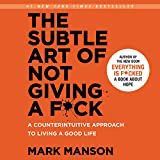
“The Subtle Art of Not Giving a F*ck” is a refreshing and irreverent take on the self-help genre. Author Mark Manson argues that many of us are too concerned with always trying to be happy and that this obsession with positivity is making us miserable. Instead, he suggests that we should focus on what matters to us and be willing to endure discomfort and pain to pursue our goals.
One of the strengths of this book is Manson’s frank and funny writing style. He doesn’t mince words, and his irreverent tone is a welcome departure from the dry and formulaic writing often found in self-help books. He peppers his advice with colorful language and relatable anecdotes, making his insights entertaining and memorable.
Another strength of this book is the way Manson challenges some of the conventional wisdom about happiness and success. He argues that it’s not always helpful to be positive or avoid negative emotions. Instead, he suggests we embrace our struggles and use them as opportunities for growth and self-discovery. “The Subtle Art of Not Giving a F*ck” is a humorous and insightful book that challenges readers to rethink their approach to happiness and success.
3. Unfu*k Yourself: by Gary John Bishop
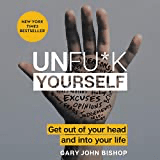
“Unfu*k Yourself” is a straightforward and no-nonsense guide to overcoming the self-limiting beliefs that hold many of us back. Author Gary John Bishop offers a refreshingly blunt approach to self-help, challenging readers to take ownership of their problems and make meaningful life changes.
One of the strengths of this book is Bishop’s use of language. He doesn’t sugarcoat his advice or try to soften the blow – instead, he speaks directly to readers and doesn’t hesitate to use profanity to get his point across. While this may not be to everyone’s taste, for many readers, Bishop’s candid and irreverent style is a welcome change from the more sanitized language often found in self-help books.
Another strength of this book is Bishop’s focus on action. He doesn’t just offer platitudes or general advice – he provides concrete strategies for readers to start making changes in their lives immediately. For example, he encourages readers to take responsibility for their actions, stop making excuses, and be willing to face discomfort and uncertainty in pursuit of their goals. “Unfu*k Yourself” is a powerful and motivating book that will resonate with readers looking for a no-nonsense approach to self-improvement.
4. Atomic Habits: by James Clear
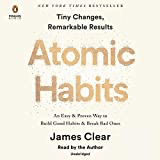
“Atomic Habits” is a comprehensive and practical guide to building better habits and breaking bad ones. Author James Clear draws on the latest research in psychology, neuroscience, and behavioral economics to offer a step-by-step process for creating lasting change in our lives.
One of the strengths of this book is Clear’s emphasis on the importance of small, incremental changes. He argues that it’s not the significant, dramatic changes that make the most difference in our lives – the small, consistent daily actions add up over time. Clear provides a wealth of strategies and techniques for building better habits, from creating simple but effective “habit stacks” to tracking our progress and staying motivated.
Another strength of this book is Clear’s engaging writing style. He uses plenty of real-world examples and relatable anecdotes to illustrate his points, and his writing is clear and accessible without being overly simplistic. He also provides readers various tools and resources, including worksheets, templates, and a free habit-tracking app.
Overall, “Atomic Habits” is an excellent resource for anyone looking to improve their habits and create lasting change. While some readers may find the book overly structured or formulaic, Clear’s practical and evidence-based approach is sure to resonate with many. His engaging writing style makes this book an enjoyable and informative read.
5. Can’t Hurt Me: by David Goggins
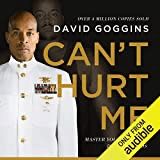
“Can’t Hurt Me” is an inspiring and brutally honest memoir by David Goggins, a former Navy SEAL, endurance athlete, and motivational speaker. In this book, Goggins shares his remarkable life story and the lessons he’s learned about pushing through pain, overcoming adversity, and achieving greatness.
One of the strengths of this book is Goggins’ powerful personal story. He grew up in poverty and experienced abuse and racism throughout childhood, but he refused to let these obstacles hold him back. Instead, he pushed himself to become a Navy SEAL, a world-class ultramarathon runner, and a sought-after motivational speaker. Goggins’ journey is inspiring and humbling, and readers will likely come away from this book with renewed motivation and purpose.
Another strength of this book is Goggins’ no-nonsense approach to self-improvement. He doesn’t offer quick fixes or easy answers – instead, he challenges readers to confront their own limitations and push past them. He emphasizes the importance of discipline, self-mastery, and resilience and provides practical tips and strategies for building mental toughness and achieving our goals.
However, some readers may find the book overly intense or aggressive. Goggins’ approach is not for everyone, and his harsh language and graphic descriptions of physical pain may be off-putting for some readers. Additionally, some readers may find it difficult to relate to Goggins’ extreme experiences and accomplishments and struggle to apply his lessons to their lives.
Overall, “Can’t Hurt Me” is a powerful and inspiring book that will resonate with readers looking for a no-nonsense approach to self-improvement. Goggins’ honest and direct style will motivate many to push past their limitations and achieve their goals.
6. Extreme Ownership: by Jocko Willink
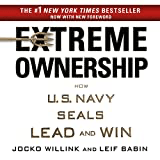
“Extreme Ownership” is a powerful and practical guide to leadership and personal responsibility by Jocko Willink, a former Navy SEAL officer and co-founder of the leadership consulting firm Echelon Front. In this book, Willink draws on his combat and business experiences to show how leadership and ownership principles can be applied in any area of life.
One of the strengths of this book is Willink’s emphasis on personal responsibility and accountability. He argues that authentic leadership requires taking ownership of our actions and decisions and that blaming others or making excuses is never productive. Willink provides numerous examples from his experiences, both in combat and in business, to illustrate the importance of owning and learning from our mistakes.
Another strength of this book is the clear and practical framework that Willink provides for implementing these principles. He breaks down the concepts of leadership and ownership into actionable steps and provides a range of tools and strategies for applying these principles in our daily lives. This includes everything from effective communication and delegation to time management and prioritization.
Overall, “Extreme Ownership” is an excellent resource for anyone looking to improve their leadership skills and take more ownership of their lives. Willink’s practical and evidence-based approach will resonate with many, and his engaging writing style makes this book enjoyable and informative.
7. The Dichotomy of Leadership: by Jocko Willink
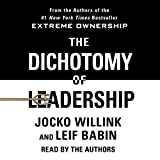
“The Dichotomy of Leadership” is a compelling and insightful follow-up to Jocko Willink’s earlier book, “Extreme Ownership.” In this book, Willink and his co-author, Leif Babin, explore leadership’s complex and often paradoxical nature and provide practical guidance for navigating these challenges.
One of the strengths of this book is the authors’ emphasis on balancing competing priorities. They argue that effective leadership requires not only taking ownership of our actions and decisions but also balancing seemingly contradictory priorities, such as being humble and confident or decisive and open-minded. Willink and Babin provide numerous real-world examples from their experiences as Navy SEAL officers and business consultants to illustrate these dichotomies and show how they can be navigated successfully.
Another strength of this book is the authors’ focus on building relationships and teams. They emphasize the importance of understanding and respecting individual differences and provide practical strategies for building team trust, communication, and camaraderie. Willink and Babin also stress the importance of fostering a culture of ownership and accountability and providing guidance for aligning individual and team goals with the overall mission.
However, some readers may find the book somewhat repetitive, as many of the concepts and examples are similar to those in “Extreme Ownership.”
Overall, “The Dichotomy of Leadership” is an excellent resource for anyone looking to deepen their understanding of leadership and develop their skills. While some readers may find the book repetitive or overly focused on dichotomies, Willink and Babin’s practical and evidence-based approach will resonate with many. Their engaging writing style makes this book enjoyable and informative.
8. The 7 Habits of Highly Effective People: by Stephen R. Covey
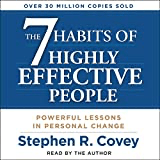
“The 7 Habits of Highly Effective People” is a classic self-help book that has sold millions of copies worldwide. In this book, Stephen R. Covey presents a comprehensive personal and professional success framework based on seven essential habits.
One of the strengths of this book is its holistic approach to personal growth and development. Covey emphasizes the importance of aligning our values, goals, and actions with our more profound sense of purpose and provides practical strategies for achieving this alignment. He also emphasizes the importance of developing strong relationships with others and provides guidance for improving communication, collaboration, and trust.
Another strength of this book is the clarity and accessibility of Covey’s writing. He presents complex concepts and ideas in a clear and concise manner and provides numerous real-world examples and case studies to illustrate his points. This makes the book easy to understand and apply, even for readers new to the self-help genre.
Overall, “The 7 Habits of Highly Effective People” is an excellent resource for anyone looking to improve their personal and professional effectiveness. While some readers may find the book overly structured or formulaic, Covey’s practical and evidence-based approach will resonate with many. His engaging writing style makes this book an enjoyable and informative read.
9. The 10X Rule: by Grant Cardone
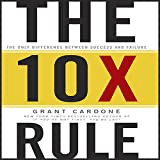
“The 10X Rule” is a motivational and ambitious book that challenges readers to rethink their goals and adopt a “massive action” mindset. In this book, Grant Cardone argues that achieving exceptional results requires not just hard work but a 10X increase in effort, creativity, and persistence.
He argues that we must take ownership of our goals, eliminate excuses, and adopt a “whatever it takes” attitude. He also stresses the importance of setting bold and ambitious goals and provides practical strategies for breaking through limiting beliefs and achieving exponential growth.
Another strength of this book is Cardone’s energetic and engaging writing style. He uses personal anecdotes, case studies, and motivational language to inspire readers to take action and pursue their dreams with relentless determination. His enthusiasm is contagious, and readers will likely feel energized and motivated after reading this book.
Cardone’s message is clearly targeted toward entrepreneurs and business owners, and some readers may feel that his approach is too aggressive or individualistic, but that is the Grant Cardone way! He is a billionaire, so he does know what he is talking about.
Overall, “The 10X Rule” is an excellent resource for anyone looking to increase their productivity, creativity, and ambition. While some readers may find the book overly focused on material success or too aggressive in its approach, Cardone’s practical and motivational advice is sure to resonate with many. His engaging writing style makes this book enjoyable and inspiring.
10. Be Obsessed or Be Average: by Grant Cardone
“Be Obsessed or Be Average” is a motivational and inspiring book that encourages readers to pursue their goals with unrelenting passion and commitment. In this book, Grant Cardone argues that mediocrity is the enemy of success and that we must be willing to become obsessed with our goals to achieve exceptional results.
He argues that we must eliminate negative beliefs and limiting thoughts and replace them with a positive and obsessive mindset focused on achieving our goals. He also stresses the importance of taking action and embracing failure as a necessary part of the learning process.
Overall, “Be Obsessed or Be Average” is an excellent resource for anyone looking to increase their motivation, commitment, and passion for achieving their goals.
11. Relentless: by Tim S. Grover
“Relentless” is a motivational and inspiring book that encourages readers to pursue their goals relentlessly. In this book, Tim S. Grover, a renowned performance coach, shares his experiences working with some of the world’s top athletes and business leaders and provides practical strategies for achieving exceptional results.
One of the strengths of this book is Grover’s emphasis on the importance of mental toughness in achieving success. He argues that we must eliminate self-doubt, fear, and distractions and develop a relentless mindset focused on our goals. He also stresses the importance of taking action and embracing failure as a necessary part of the learning process.
Another strength of this book is Grover’s straightforward and no-nonsense writing style. He uses personal anecdotes, case studies, and motivational language to inspire and motivate readers to take action and pursue their dreams with relentless determination. His no-excuses approach is refreshing and empowering, and readers will likely feel motivated and energized after reading this book.
Overall, “Relentless” is an excellent resource for anyone looking to increase their mental toughness, focus, and determination. While some readers may find the book overly focused on performance or too intense in its approach, Grover’s practical and motivational advice is sure to resonate with many. His straightforward writing style makes this book enjoyable and inspiring.
12. Maps of Meaning: by Jordan B. Peterson
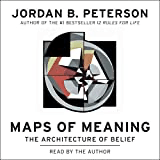
“Maps of Meaning” is a complex and thought-provoking book exploring human motivation, belief systems, and meaning-making psychology. In this book, Jordan B. Peterson draws on various disciplines, including psychology, mythology, religion, and philosophy, to comprehensively understand the human psyche.
One of the strengths of this book is Peterson’s deep and insightful analysis of human behavior and belief systems. He argues that humans are motivated by a complex interplay of biological, social, and cultural factors. We create meaning through narratives and myths that help us make sense of the world. His analysis is rich and nuanced and provides a wealth of insights into the nature of human psychology.
Another strength of this book is Peterson’s engaging and accessible writing style. Despite the complexity of the topics he discusses, he explains his ideas clearly and engagingly, using examples and anecdotes to illustrate his points. His writing is scholarly and accessible, and readers will likely find his ideas both thought-provoking and enlightening.
However, some readers may find the book overly dense and challenging to follow. Peterson’s analysis is highly detailed and requires significant concentration and focus to grasp fully. Additionally, some readers may find his conclusions controversial or objectionable, particularly in relation to his views on religion and politics.
Overall, “Maps of Meaning” is a challenging and thought-provoking book that offers a unique perspective on the nature of human psychology and meaning-making. While some readers may find the book overly dense or controversial in its conclusions, Peterson’s profound insights and engaging writing style make it a valuable resource for anyone interested in understanding the complexities of human motivation and belief systems.
13. How to Win Friends & Influence People: by Dale Carnegie
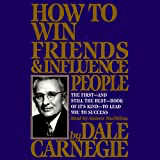
“How to Win Friends & Influence People” is a classic self-help book that has stood the test of time. In this book, Dale Carnegie offers practical advice on improving your social skills and building strong, positive relationships with others.
One of the strengths of this book is its emphasis on empathy and understanding. Carnegie argues that the key to winning friends and influencing people is to focus on their needs and interests rather than your own. He provides numerous examples and case studies to illustrate his points, and his advice is practical and actionable.
Another strength of this book is its accessibility. Although written in the 1930s, Carnegie’s advice is still relevant and applicable today. His writing style is engaging and easy to read, and his examples and anecdotes make the book informative and entertaining.
Overall, “How to Win Friends & Influence People” is a timeless classic offering valuable insights into human relationships’ nature. While some readers may find the book overly simplistic or formulaic, Carnegie’s emphasis on empathy and understanding is a valuable lesson for anyone looking to improve their social skills and build positive relationships with others.
Conclusion
In conclusion, the self-improvement genre is a vast and diverse field that offers many insights and practical advice for those looking to enhance their personal and professional lives. From classics like “How to Win Friends & Influence People” by Dale Carnegie to modern bestsellers like “Atomic Habits” by James Clear and “Can’t Hurt Me” by David Goggins, these books provide valuable tools and strategies for improving oneself and achieving success.
While each book offers its unique perspective and approach, common themes run throughout the genre, such as the importance of goal-setting, self-discipline, and a growth mindset. These principles have been shown to be effective in a wide range of contexts, from personal relationships to business and career success.
Ultimately, the key to success in self-improvement is not just reading these books but also putting their advice into practice. By adopting a proactive and intentional approach to personal growth, we can unlock our full potential and achieve our desired success and fulfillment.

